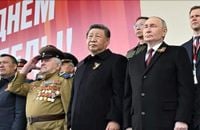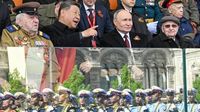On May 9, 2025, the world witnessed a significant display of Russian military might and political messaging as President Vladimir Putin addressed the nation during the Victory Day parade in Red Square, Moscow. This year marks the 80th anniversary of the Soviet victory over Nazi Germany, a pivotal moment in Russian history that Putin has leveraged to reinforce national pride and support for the ongoing military campaign in Ukraine.
Putin, flanked by over 20 foreign dignitaries including Chinese President Xi Jinping and Brazilian President Luiz Inácio Lula da Silva, declared that "all" of Russia supports the offensive in Ukraine. His remarks came amidst a backdrop of military parades showcasing both historical and modern military hardware, including T-34 tanks from World War II and contemporary T-90M tanks. "The entire country, society, and people support the participants in the special military operation. We are proud of their courage and determination," he stated, emphasizing a narrative of unity and strength in the face of adversity.
During his speech, Putin reiterated that Russia will continue to be an insurmountable obstacle against Nazism, Russophobia, and anti-Semitism, framing the current conflict as a moral battle. "Truth and justice are on our side," he proclaimed, drawing a direct line between the sacrifices of past generations and the sacrifices being made today in Ukraine.
However, the day's events were overshadowed by ongoing violence in Ukraine. Just hours before the parade, airstrikes exchanged between Moscow and Kiev led to airport closures in Russia and at least two reported deaths in Ukraine. Despite Putin's announcement of a three-day truce, which began at midnight on May 8, Ukraine dismissed it as a mere public relations stunt and instead called for a more extended cessation of hostilities lasting 30 days.
In response to the escalating conflict, Ukrainian President Volodymyr Zelensky indicated that Ukraine is ready for negotiations but insisted that Russia must demonstrate a genuine commitment to peace. "For this to happen, Russia must show that it seriously wants to end the war, starting with a complete and unconditional ceasefire," he stated in a message shared on social media.
Amidst the celebrations, Italian Foreign Minister Antonio Tajani criticized the event as a "parade of autocracies," warning that the lack of balance in global power dynamics could jeopardize peace. He urged the need for comprehensive security measures beyond mere military expenditure, emphasizing the importance of infrastructure and cyber defenses.
Putin's display of military power was not just a show of force but also a strategic move to rally domestic support and project strength internationally. The parade included 1,500 soldiers who had fought in Ukraine, symbolizing the Kremlin's narrative of heroism and sacrifice. "We are proud of the courage and determination of our troops engaged in the special military operation," Putin remarked, reinforcing the idea that the conflict is a continuation of the fight against fascism.
As the parade unfolded, Putin also took a moment to greet North Korean soldiers, expressing his best wishes to them and their troops, further highlighting the Kremlin's alliances with nations often viewed as adversaries by the West. This gesture was part of a broader strategy to showcase Russia's global partnerships amid increasing isolation due to sanctions and diplomatic pressures.
In the wake of the parade, the geopolitical landscape remains tense. Donald Trump, through a social media post, announced that talks between the U.S., Russia, and Ukraine are ongoing, advocating for a 30-day ceasefire. He expressed hope that a mutually acceptable truce could be established, warning that failure to adhere to it would result in increased sanctions against Russia.
Meanwhile, Ursula von der Leyen, President of the European Commission, expressed her support for a 30-day ceasefire during a recent conversation with Zelensky, highlighting the EU's commitment to Ukraine's sovereignty and security. "The EU will stand by Ukraine to strengthen its position at the negotiating table and help achieve a fair and lasting peace," she affirmed.
As the world watches these developments, the situation in Ukraine remains precarious. The Ukrainian Security Service recently announced the arrest of two alleged Hungarian spies operating within a military intelligence network, underscoring the complexities of the ongoing conflict and the international ramifications of espionage.
In conclusion, the events of May 9, 2025, serve as a stark reminder of the intertwining of historical memory and contemporary geopolitical struggles. As Russia celebrates its past victories, the current conflict in Ukraine continues to unfold, leaving both nations and the international community grappling with the implications of ongoing hostilities and the search for peace.


